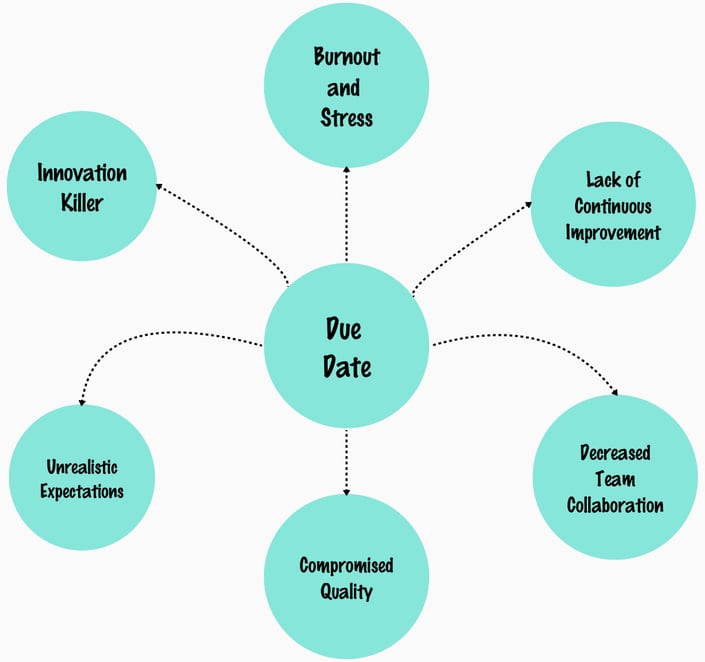What are the negative impacts of a "Due Date" culture on the success of an organization?
Discover the detrimental effects of the 'due date' culture in organizations. Explore how rigid deadlines can undermine quality, teamwork, and long-term success. Learn strategies to foster a healthier project environment.


The "due date" culture in organizations, driven by strict deadlines and an emphasis on rapid delivery. They can have several negative impacts on projects, teams, and overall project outcomes.
While deadlines are important for project management, overemphasis on them without considering other critical factors can lead to detrimental effects.
Here are some of the bad impacts of the due date culture :
Compromised Quality:
"When there's pressure to meet a due date, testing might be shortened or skipped altogether"
This can lead to buggy software, security vulnerabilities, and a poor user experience. Ultimately, the need to meet the due date can outweigh the importance of delivering a reliable and well-tested product.
A rushed development cycle can lead to inadequate testing and debugging. Leading failure to identify and rectify issues before the product reaches the end-users.


Burnout and Stress
"Long working hours, constant pressure, and a lack of work-life balance can result in reduced morale, decreased productivity, and even high turnover rates."
Constantly working under tight deadlines can lead to burnout and high levels of stress among team members. This not only affects the well-being of employees but also hampers the overall project effectiveness.
Creativity and Innovation Killer
"In a due date-driven culture, there might be little room for creativity, exploration, and innovations"
Software projects requires creative problem-solving, thinking outside the box, and experimenting with new solutions. When the primary focus is on meeting deadlines, these aspects can be stifled, leading to missed opportunities for breakthrough solutions
Unrealistic Expectations
"Unrealistic expectations is a secret ingredient to set up the project for failure"
Stakeholders might expect complex projects to be completed within unreasonably short timeframes. Team starts to work without proper evaluation of problem & its feasibility. Chances are team will build products which doesn't solve the problem but solve the Stakeholders expectations.
Decreased Team Collaboration
"It creates Selfish Culture in the team. Everyone is trying to save themselves"
A focus solely on deadlines can discourage effective collaboration among team members. Instead of working together to solve problems and ensure the best possible outcome, team members might prioritize individual tasks and siloed work to meet personal deadlines. This can lead to a breakdown in communication and a fragmented project.
Lack of Continuous Improvement
"It fosters tactical solutions, strategy goes for toss"
A due date culture often emphasizes completing the current project quickly rather than focusing on learning from past experiences and improving processes for future projects. This prevents organizations from developing more efficient workflows and best practices over time
In conclusion, while meeting deadlines is an essential aspect of project management, a culture that places undue pressure on due dates at the expense of other factors can lead to negative outcomes. Striking a balance between delivering on time and maintaining quality, innovation, and the well-being of the team is crucial for the long-term success.
